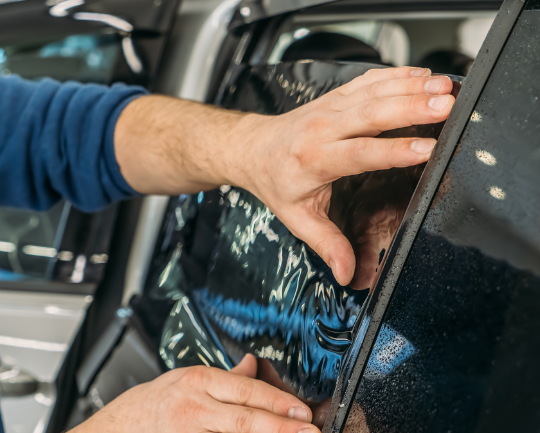Windows plays a crucial role in your vehicle’s overall aesthetics and functionality, and choosing the right window tint can enhance both.
From providing privacy to protecting against harmful UV rays, window tinting has numerous benefits. However, with many options available, selecting the right window tint for your car can be daunting.
In this guide, we’ll delve into the various aspects to consider when choosing the perfect window tint for your vehicle.
Understanding Window Tint Basics
Before diving into the selection process, it’s essential to understand the basics of window tinting. Window tint is a thin film applied to the interior surface of a car’s windows. It typically consists of layers of polyester film treated to enhance the performance and appearance of the glass. Tinting involves adhering the film to the glass using a unique adhesive.
Benefits of Window Tinting
Window tinting is more than just a cosmetic enhancement for your vehicle; it brings a range of practical advantages that enhance your driving experience. From safeguarding your health to protecting your car’s interior, here are some key benefits of window tinting.
UV Protection
Opting for window tinting goes beyond aesthetics; it’s crucial for safeguarding your well-being. The film’s ability to block harmful ultraviolet (UV) rays is one of its primary benefits. Prolonged exposure to UV rays is associated with skin damage and an increased risk of skin cancer. Window tinting is a reliable barrier, significantly reducing the UV rays entering your car and providing added protection for you and your passengers.
Heat Reduction
During scorching summer months, window tinting proves invaluable by effectively blocking a substantial amount of solar heat. This not only keeps your car’s interior noticeably cooler but also reduces reliance on air conditioning. The result is improved fuel efficiency, contributing to comfort and economical driving. The tint’s capacity to minimize heat buildup within the vehicle enhances overall driving comfort, making each journey more enjoyable, especially in hot and sunny conditions.
Glare Reduction
Enhancing safety and comfort, tinted windows are crucial in minimizing glare from the sun and headlights. This feature is particularly beneficial during dawn, dusk, or nighttime driving. Reduced glare improves visibility, reducing eye strain and promoting a safer driving experience. By creating a more comfortable environment, tinted windows contribute to an overall enhanced driving experience, ensuring you remain focused on the road without the discomfort caused by excessive glare.
Privacy
Beyond practical advantages, window tinting adds more privacy to your car. This is especially valuable when parked in bustling areas or overnight. The tint is a visual barrier, preventing prying eyes from peering into your vehicle and preserving your personal space. This added privacy enhances security and contributes to a more comfortable and secure feeling while driving. It’s a practical solution for those who value their privacy and want to deter potential thieves by limiting visibility into the car.
Interior Protection
Over time, sunlight can cause fading and damage to your car’s interior components. Window tinting acts as a protective barrier, shielding your upholstery, dashboard, and other interior elements from the harmful effects of prolonged sun exposure. By preserving the aesthetic appeal of your car’s interior, tinting contributes to its overall longevity and resale value. This aspect of interior protection ensures that your vehicle remains in top condition, maintaining its value and appearance throughout its lifespan.
Factors to Consider When Choosing Window Tint
1. Legal Regulations
Before diving into the different types of window tints, it’s crucial to familiarize yourself with the legal regulations in your region. Each country, state, or municipality may have specific laws governing the darkness and reflectivity of window tint. Ensure that the tint you choose complies with these regulations to avoid legal complications and fines.
2. Tint Percentage
Window tint darkness is measured as a percentage, with lower percentages indicating darker tints. The percentage represents the amount of light that can pass through the tint. For example, a 5% tint allows only 5% of light to pass through, making it very dark. Consider your local regulations and personal preferences when choosing the tint percentage. Remember that darker tints provide more privacy but may reduce visibility, especially at night.
3. Type of Window Tint
There are various types of window tint films available, each offering unique features. The most common types include:
- Dyed Film: This type of tint uses a dye that absorbs solar heat, reducing glare and heat inside the vehicle. It’s an affordable option, but it may fade over time.
- Metalized Film: Metalized tints contain metallic particles that reflect sunlight and heat away from the vehicle. They are durable and effective at reducing heat but can interfere with electronic signals.
- Carbon Film: Carbon tints are a high-quality option that does not contain metal, eliminating signal interference. They offer excellent heat rejection and UV protection while maintaining a sleek appearance.
- Ceramic Film: Considered the premium option, ceramic tints provide superior heat rejection, UV protection, and glare reduction. They are also non-metallic, ensuring no interference with electronic devices. While more expensive, ceramic tints offer excellent longevity and performance.
4. UV Protection
One of the primary reasons for installing window tint is to protect yourself and your passengers from harmful UV rays. UV radiation from the sun can lead to skin damage and increase the risk of skin cancer. Look for window tints that mention high UV protection levels, as this will contribute to a safer and healthier driving environment.
5. Heat Rejection
Depending on your location and climate, heat rejection may be a crucial factor in your decision. Some window tints are designed to block a higher percentage of solar heat, keeping your car cooler in hot weather. Ceramic and metalized films often excel, effectively rejecting heat without compromising visibility.
6. Glare Reduction
Glare from the sun or headlights of other vehicles can be a significant safety concern. Choosing a window tint with glare-reduction properties can enhance visibility and reduce eye strain, especially during long drives or when driving in bright sunlight.
7. Aesthetics and Privacy
Window tinting is also a cosmetic choice, enhancing the overall appearance of your vehicle. Consider your preferences regarding the aesthetics of your car and how much privacy you desire. Darker tints provide more privacy, but remember that excessively dark tints may hinder visibility, particularly at night.
 Installation and Maintenance Tips
Installation and Maintenance Tips
Once you’ve chosen the right window tint for your car, proper installation, and maintenance are essential to ensure optimal performance and longevity. Here are some tips:
- Professional Installation: While DIY window tint kits are available, it’s recommended to have your window tint professionally installed. Professional installers have the experience and tools to ensure a seamless application without bubbles or imperfections.
- Adherence to Cure Time: After installation, window tint films need time to cure and adhere properly to the glass. Avoid rolling down the windows for the specified curing period to prevent damage to the tint.
- Cleaning and Maintenance: Clean your tinted windows with a mild, ammonia-free cleaner and a soft, non-abrasive cloth. Avoid using abrasive materials or harsh chemicals, as they can damage the tint. Regular maintenance will keep your window tint looking clear and ensure its longevity.
Conclusion
Choosing the right window tint for your car is a decision that involves careful consideration of legal regulations, personal preferences, and specific features offered by different tint types. Whether you prioritize UV protection, heat rejection, or privacy, there is a window tint solution that meets your needs.
Investing in a high-quality window tint not only enhances the aesthetics of your vehicle but also provides numerous practical benefits. From safeguarding your health against harmful UV rays to reducing glare and maintaining a cooler interior, the right window tint can transform your driving experience.
Remember to adhere to local regulations, choose the appropriate tint percentage, and opt for professional installation to ensure optimal results. By making an informed decision, you can enjoy the many advantages a well-selected window tint brings to your car.




